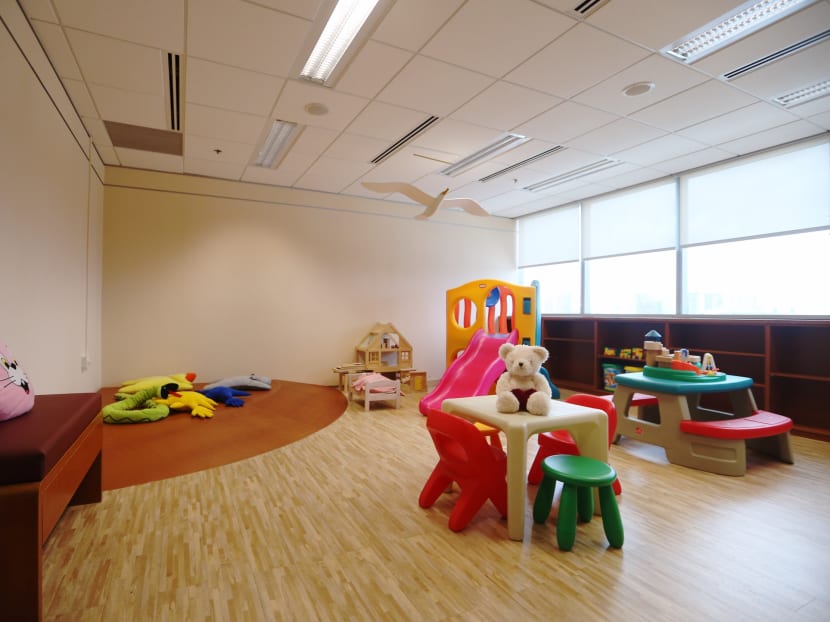One-stop centre among measures to lessen trauma of sex-crime victims
SINGAPORE — To reduce the emotional trauma and stress victims of sex crimes face and to strengthen investigation processes for such offences, the authorities are looking to introduce new measures, including having a one-stop centre to interview and provide medical examinations for victims.

The interior of the Kids Interview Room, taken during the media tour of OneSAFE Centre at Police Cantonment Complex, on Feb 17 2017. Photo: Koh Mui Fong/TODAY
SINGAPORE — To reduce the emotional trauma and stress victims of sex crimes face and to strengthen investigation processes for such offences, the authorities are looking to introduce new measures, including having a one-stop centre to interview and provide medical examinations for victims.
In addition, they will enhance police officers’ training to sensitively handle their cases.
The Ministry of Home Affairs (MHA) and the Ministry of Law (MinLaw) are also undertaking two separate reviews: The first is on court processes, to make it less stressful for victims undergoing trials, and a second one is on existing penalties for sexual offences, to see if they are adequate.
These reviews come in the wake of improper questions posed by a defence lawyer in a recent trial, and fresh allegations that a police officer had handled a molestation complaint poorly.
Law and Home Affairs Minister K Shanmugam, who called for a review of investigation and court processes last year, had cited two court cases where victims of sex crimes had to face personal questions about their bodies and behaviour.
One case involved Singaporean lawyer Edmund Wong Sin Yee, who was rebuked by a district judge last August when he focused on a molest victim’s breasts during his cross-examination.
Speaking at a media briefing on Friday (Feb 17), Mr Shanmugam said the objective of relooking the measures is to ensure an effective criminal justice system.
This, he added, could be achieved by making it easier for victims to report sexual assault cases, to reduce stress on them, as well as to ensure that punishments for serious crimes “commensurate with the gravity of the offences”.
“One of the key issues is, of course, to encourage victims to come forward and make the whole experience something that doesn’t add to their trauma,” he said.
He added that, in reviewing the courtroom processes, there is a need for a balancing act to ensure a robust cross-examination, while looking at how to make the trial process less intimidating for the victim.
Since Jan 15, the police and Singapore General Hospital have set up the One-Stop Abuse Forensic Examination (OneSafe) centre at the Police Cantonment Complex, to serve adult rape victims whose cases are reported within 72 hours of the assault.
Previously, there have been situations where victims had to go to the hospitals to lodge a report and to get a medical check-up, before reporting to the Criminal Investigation Department at the complex.
By the third quarter of this year, there will be a new training video for police officers — a collaboration between the police and the Association of Women for Action and Research (Aware) — featuring victims from Aware’s Sexual Assault Care Centre, who would share their feelings and thoughts about the investigation process.
And to familiarise victims with the various processes, the police and MinLaw will produce an information pamphlet, set to be rolled out in the fourth quarter of this year.
To better protect victims’ privacy, MinLaw is also considering protecting their identities from the point an allegation is made, and allowing the use of physical screens in court to shield them from the accused, to alleviate their fears of testifying. It is also exploring having mandatory in-camera hearings of testimonies by sexual assault victims. Right now, it is compulsory for only female victims aged 16 and below.
In the long term, the MHA and the Ministry of Social and Family Development are exploring multi-disciplinary interviewing models for cases of child abuse within families. The aim is to reduce the need for victims to recount their traumatic experience repeatedly to different officers.
The MHA said that the new initiatives would complement existing measures, which include the Victim Care Cadre Programme that provides emotional support to victims, and specialist courses for investigation officers handling serious sexual crime cases.






